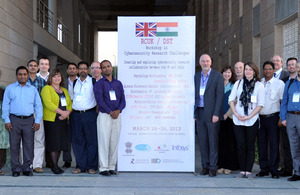Cyber security workshop brings together top researchers from India and the UK
Cyber security has been highlighted as a key priority for future activities between the UK and India

RCUK-DST Cyber Security Workshop
Research Councils UK (RCUK) and India’s Department of Science and Technology have brought together top researchers from India and the UK for a workshop in New Delhi to discuss cyber security, a pressing transnational issue demanding global cooperation.
The four-day workshop, which began on Sunday (24 March), has been jointly organised by RCUK India, the Indraprastha Institute of Information Technology-Delhi (IIIT-D), and the UK’s Science and Innovation Network (SIN), with the RCUK Global Uncertainties programme. This programme brings together the activities of the UK Research Councils in response to global security challenges.
The main topics of discussion at the workshop include: cyber crime; privacy and security in online social media; human factors and usable security; and risk identification and monitoring systems and networks. The world’s increased reliance on electronic systems means that cyber attacks are likely to have significant damaging consequences. The combination of enhanced threats, increased vulnerabilities and more serious consequences increases the cyber risk to which we are all exposed.
Dr Helen Bailey, Deputy Director of RCUK India, said: “We need a clearer understanding of our current and future vulnerabilities and the inadequacies of current approaches, along with innovative solutions to tackle the important challenges.”
Prof Ponnurangam Kumaraguru, from IIIT Delhi, added: “We are also exploring the strengths and complementarities of our respective research capabilities; and identifying key areas of research which may offer a great potential for international research collaboration for mutual benefit.”
This workshop is part of the growing research relationship between the UK and India, in the last 4 years there has been a large increase in the amount of co-funded research from just under £1m in 2008 to over £100m today. Cyber security has been highlighted as a key priority for future activities between the UK and India.
British scholars associated with IBM, McAfee, BT, City University, The Royal Society, Imperial College, Queens University Belfast, Northumbria, Durham, Lancaster and Southampton Universities are among those participating in the event, along with researchers from the Indian government’s Department of Science and Technology, IIIT-Delhi, Infosys, IIIT Hyderabad, IIITM Gwalior, C-DAC, TIFR, NIT Surat, NITK Surathkal, Symantec, BITS Hyderabad and Malaviya NIT Jaipur.
The UK researchers and some Indian researchers will also be visiting the Infosys campus in Hyderabad, where they will meet with researchers to explore common areas of interest.
Notes to Editors
For further information, please contact:
Geeny George, Communications Manager, RCUK India
Melanie Knetsch, RCUK Global Uncertainties programme Phone: +44 1793 413049
Prof. Ponnurangam Kumaraguru, IIIT- Delhi
- The RCUK Global Uncertainties Programme brings together the activities of the UK Research Councils in response to global security challenges. The programme will help governments, businesses and societies to better predict, detect, prevent and mitigate threats to security and runs from 2008 to 2018. The Economic and Social Research Council is leading the programme on behalf of the Research Councils, which supports £384 million portfolio of research and activities relevant to Global Uncertainties.
The RCUK Global Uncertainties Programme focuses on six core areas:
- ideologies and beliefs
- terrorism
- transnational organised crime
- cybersecurity
- threats to infrastructures
-
proliferation of chemical, biological, radiological, nuclear (CBRN) weapons and technologies.
-
Research Councils UK are represented in India by RCUK India, based at the British High Commission. This initiative was co-hosted by RCUK India. RCUK India was established in 2008 with an aim to facilitate research partnerships and enable the best researchers in the UK and India to develop high-quality, high impact collaborations.
- Research Councils UK (RCUK) is the strategic partnership of the UK’s seven Research Councils who annually invest around £3 billion in research. We support excellent research, as judged by peer review that has an impact on the growth, prosperity and wellbeing of the UK. To maintain the UK’s global research position we offer a diverse range of funding opportunities, foster international collaborations and provide access to the best facilities and infrastructure around the world. We also support the training and career development of researchers and work with them to inspire young people and engage the wider public with research. To maximise the impact of research on economic growth and societal wellbeing we work in partnership with other research funders including the Technology Strategy Board, the UK Higher Education Funding Councils, business, government, and charitable organisations.
The seven UK Research Councils are:
- Arts and Humanities Research Council (AHRC)
- Biotechnology and Biological Sciences Research Council (BBSRC)
- Economic and Social Research Council (ESRC)
- Engineering and Physical Sciences Research Council (EPSRC)
- Medical Research Council (MRC)
- Natural Environment Research Council (NERC)
-
Science and Technology Facilities Council (STFC)
-
India’s Department of Science & Technology plays a pivotal role in promotion of science & technology in the country. The department has wide ranging activities including the promotion of high end basic research and development of cutting edge technologies.
-
IIIT Delhi is a centre of excellence in information technology education, training and research. Its twin objectives are:
- To carry out advanced research and development in information and software technologies
-
To train and educate, at both undergraduate and postgraduate levels, engineers of outstanding ability
- The UK’s Science and Innovation Network in India encourages partnerships between academia, research establishments and businesses in the UK and India